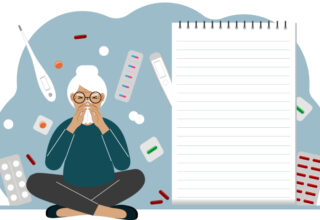Most of us have experienced that uncomfortable, bloated feeling after a big meal or eating something greasy. Whether it’s a burning sensation, fullness, or feeling a bit off in your stomach — it’s often what we call indigestion.
In this blog, we’ll break down what indigestion actually is, what might be causing it, and how you can find relief when it strikes.
What is Indigestion?
Indigestion, also known as dyspepsia is the discomfort or pain in your stomach that you feel after eating. It is usually not a sign of something very serious and can be managed at home. For some people it happens occasionally and is mild. For others, it can be frequent and affect daily life.
Common Symptoms of Indigestion:
Indigestion doesn’t feel the same for everyone. Here are some common symptoms that many people experience:
- A feeling of fullness during or after meals (even when you haven’t eaten much)
- Upper abdominal discomfort or pain
- Feeling full soon after eating
- A burning feeling in your upper stomach (like that in heartburn)
- Bloating or sensation of tightness in your tummy
- Burping or loud stomach gurgling
- Farting
- Nausea
- Regurgitation (bringing up food or bitter tasting fluid in your mouth)
- Loss of appetite
These symptoms might come shortly after eating or even hours later.
Common Causes of Indigestion:
Indigestion can be triggered by many things. Sometimes it can be due to something as simple as eating too fast or too much. Other times, it may point towards something more persistent.
Lifestyle and Dietary Triggers:
There are many lifestyle factors and dietary habits that can contribute to indigestion. Some common ones are:
- Overeating or eating too fast
- Eating fatty, greasy, or spicy foods
- Taking too much caffeine, alcohol, or carbonated drinks
- Eating late at night
- Being overweight
- Overuse of NSAIDs (like aspirin or ibuprofen)
- Smoking
- Stress and anxiety
Pregnancy can also cause indigestion. It’s quite common after 27 weeks of pregnancy. It can be due to hormonal changes and growing uterus putting pressure on the stomach.
Medical Conditions:
There are many medical conditions that can cause indigestion. These include:
- Acid reflux or gastroesophageal reflux disease
- Gastritis (inflammation of the stomach lining)
- Peptic ulcers
- Gallstones
- Pancreatitis (inflammation of pancreas)
- Bacterial infection in your stomach (H.pylori)
- Gastroparesis (food moving too slowly out of your stomach)
- Irritable Bowel Syndrome (IBS)
- Celiac disease
- Food intolerances like lactose intolerance
- Intestinal ischemia (reduced blood flow in the intestines)
- Stomach cancer
Medicines:
There are some medications that can also cause indigestion. These include:
- Non steroidal anti-inflammatory drugs (NSAIDs) like ibuprofen and aspirin
- Certain antibiotics
- Bisphosphonates
- Iron and potassium supplements
Management and Treatment:
The good news is that indigestion often improves with simple changes in lifestyle and eating habits. Here’s what can help:
Lifestyle Changes:
- Eat small meals more frequently instead of taking large portions
- Chew slowly and take your time while eating
- Cut back on spicy, fried, or high fat foods
- Avoid the foods that trigger acid reflux or indigestion
- Reduce your intake of caffeine, carbonated drinks
- Don’t eat 3 to 4 hours before going to bed and avoid lying down right after meals
- Use pillows to raise your head and shoulders up to prevent stomach acid coming up while you sleep
- Manage your stress by trying relaxation techniques like deep breathing, meditation, and yoga
- Exercise regularly as it helps in digestion and reduces stress
- Reduce weight, if you’re overweight
- Avoid alcohol and smoking
- If you smoke, quit smoking as smoking worsens indigestion and acid reflux. If you need help and support, there are services like NHS stop smoking services that can help you quit smoking.
Over-the Counter Medications:
If lifestyle and dietary changes are not enough for you, you can also try over-the-counter medications that can ease symptoms of indigestion. These include:
- Antacids: These help neutralise stomach acid
- H2-receptor blockers: These reduce production of stomach acid (e.g ranitidine)
- Proton pump inhibitors (PPI): These help in reducing stomach acid (e.g omeprazole)
It’s always best to consult your healthcare provider before using these medicines regularly, especially PPIs.
When to See a Doctor:
Usually you don’t need to see your doctor for mild indigestion and it can be treated at home. But if it is persistent or you notice any alarming signs, it’s time to seek medical advice.
- Indigestion that lasts longer than 2 weeks
- Unexplained weight loss
- Difficulty swallowing
- Frequent vomiting
- Blood in vomit or stools
- Severe persistent abdominal pain
- Shortness of breath
Seek immediate medical help if you experience:
- Shortness of breath, sweating, or chest pain radiating to the arm, neck, or jaw. These can be a sign of something more serious, like a heart problem, and shouldn’t be ignored
Final Thoughts:
Indigestion might be common, but it doesn’t mean you have to live with it. Often small changes like how and what you eat can make a big difference. But if your symptoms are frequent or severe, don’t just ignore them, as there can be an underlying cause that needs attention.
Take care of your digestive health, listen to your body, and don’t hesitate to reach out to your doctor if something doesn’t feel right.








